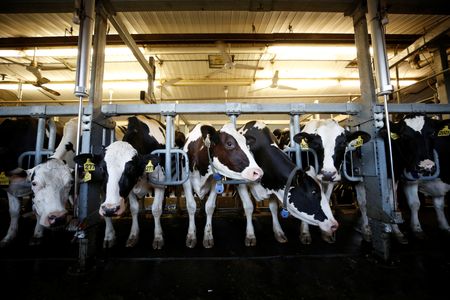WINNIPEG, Manitoba (Reuters) – The United States on Tuesday said it was seeking a second trade dispute settlement panel over Canada’s dairy import quotas, accusing Canada of not meeting obligations to open its market to American producers. The move is the latest salvo in longstanding tensions between the trade partners over Canada’s protected dairy industry.
HOW DOES CANADA’S DAIRY SYSTEM WORK?
Canada has tightly controlled supplies of dairy, eggs and poultry since the 1970s, restricting how much farmers can produce and limiting imports through onerous tariffs.
Quotas restrict how much farmers produce according to domestic demand.
Import quotas limit the quantity of product that can enter Canada from other countries at a low rate of duty.
The Canadian Dairy Commission, a government corporation, sets a milk price annually that dairy processors pay to farmers.
A WTO panel ruled in 2002 that Canada breached its trade obligations through its dairy support, siding with the United States. The result of the WTO ruling is that Canada is not allowed to export much dairy.
WHY IS THE UNITED STATES UPSET?
U.S. dairy processors want to increase sales to Canada but high tariffs stand in the way.
The U.S. Trade Representative’s Office alleges that Canada uses an unfair approach to determining quota allocations under the U.S.-Mexico-Canada Agreement on trade, effectively prohibiting some market participants like Canadian retailers and food service operators from using the allocations.
Canada’s trade minister, Mary Ng, said she was disappointed in the U.S. move and would oppose its attempts to “re-negotiate” during the settlement process.
WHAT IS THE VALUE OF CANADA’S DAIRY SECTOR?
Farm dairy sales amount to C$7.39 billion ($5.54 billion)annually in Canada. Processed dairy shipments are worth C$16.2 billion, according to 2021 government figures.
WHY DOES CANADA WANT TO KEEP THE SYSTEM?
All major political parties say they support supply management because it stabilizes incomes for dairy farmers.
Producers in other countries have suffered from volatile price swings.
Canada’s 9,739 dairy farmers form one of the most influential lobbies in the country. Most farm in Quebec and Ontario, the Canadian provinces with the most parliamentary seats.
WHAT DO OTHERS SAY?
Other dairy-producing countries such as New Zealand say Canada’s controls are an unfair way to shelter the Canadian industry.
Within Canada, some groups say supply management prevents the country from becoming a dairy-exporting power, as it is in grain and meat. They argue that severely restricting imports results in higher Canadian food prices.
($1 = 1.3343 Canadian dollars)
(Reporting by Rod Nickel in Winnipeg, editing by Deepa Babington)

